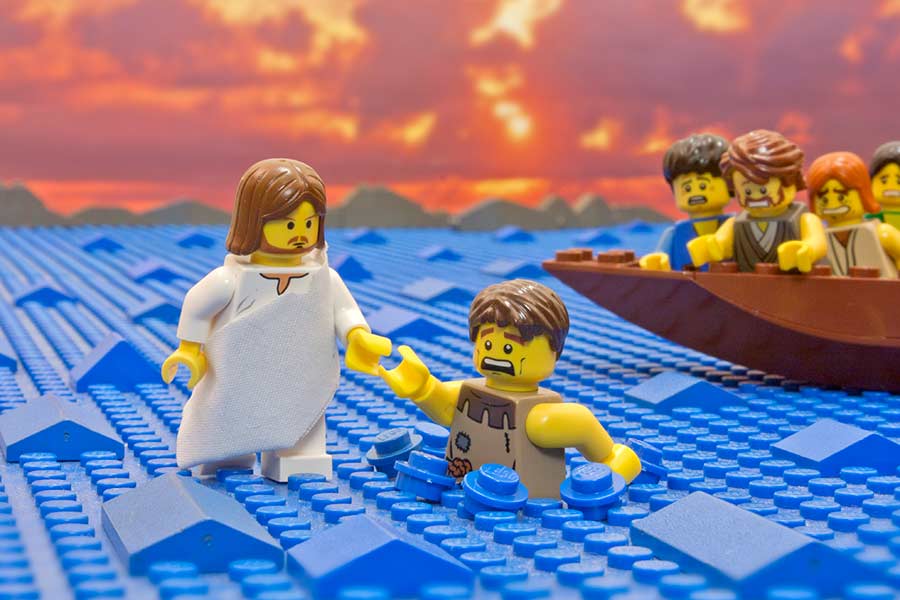King Noah was wicked and did not obey God's commandments. He took many wives and caused his people to commit all kinds of abominations and whoredoms. He burdened his people with a 20% tax on everything they possessed and used the revenue to build himself a spacious and finely decorated palace.
Sources:
• Mosiah 11:1-10
King Noah replaced the good priests that his father Zeniff had appointed with priests who spoke flattering things to him, but who were idolatrous, prideful, and lazy, and spent their time with prostitutes. The new priests were supported in their laziness, idolatry, and whoredoms by the taxes on the people, which they had to work extremely hard to pay.
Sources:
• Mosiah 11:5-7, 14
King Noah had vineyards planted all over the land and had wine presses built so that wine could be made in abundance. And so he and his people became drunkards, and the king spent his time in riotous living among his wives and concubines.
Sources:
• Mosiah 11:14-15
• Book of Mormon Stories, (1997), 38–42
At this time a prophet named Abinadi came forth and went among the people saying, "Jesus says, 'I have seen the wickedness and abominations of this people, and unless they repent, I will visit them in my anger, and make them slaves to their enemy. Then they will know that I, their God, am a jealous God.’"
Sources:
• Mosiah 11:20-23
• Book of Mormon Stories, (1997), 38–42
The people were very angry at Abinadi for saying such things, and tried to kill him, but Jesus saved him from their grasp. When King Noah heard what Abinadi had said, he was furious, and said, "Who is this Abinadi to judge my people? And who is this Jesus to bring such terrible suffering?" The king ordered Abinadi be brought to him and put to death, but no one could find him.
Sources:
• Mosiah 11:26-27
Two years later Abinadi returned among the people in disguise, and nobody recognized him. He began to prophesy again, saying, "Jesus says, 'Because you have not repented, I will visit you in my fierce anger, and you will be put in bondage and whipped and driven like mules. I will strike you with famine and disease so that you howl all day long. You will be killed, and dogs and vultures will devour your corpses.'"
Sources:
• Mosiah 12:1-5
The people were angry with him and tied him up and brought him before the king, saying, "This man was prophesying evil, saying God will destroy our people, and he said that you will become like a garment in a furnace, becoming a dried-up stalk trampled underfoot by beasts because of your wickedness. What should we do with him?"
Sources:
• Mosiah 12:9-16
King Noah said, "Take him away and kill him. What use is he to us? He is insane." But when they tried to seize him, they could not. The Holy Ghost was protecting Abinadi. His face began shining very brightly, and he recited the Ten Commandments. He told the people to repent and believe in Jesus Christ, lest they be declared evil in the Final Judgment and become eternally damned as subjects of Satan.
Sources:
• Mosiah 12:17
• Book of Mormon Stories, (1997), 38–42
• Mosiah 16:10-11
One of King Noah's priests, a young man named Alma, believed the prophet's words, and when Abinadi had finished speaking, Alma pleaded with the king to allow Abinadi to leave in peace. But this upset the king even more, and he sent his servants after Alma to kill him, but Alma fled and hid himself, and wrote down all the things that Abinadi had said.
Sources:
• Mosiah 17:1-4
The other priests convinced King Noah that Abinadi must be put to death for having abusively insulted the king. And so Abinadi was brought out to be burned at the stake. As the flames began to scorch him, he shouted, "God will take vengeance, sending you all kinds of disease, and causing you to be hunted down like an animal, and you too will suffer the pains of being burned alive!" And then Abinadi died.
Sources:
• Mosiah 17:11-20
Not long after this, the Nephites in Noah's kingdom became divided, and one faction vowed to kill the king. At this time of division within the kingdom, the Lamanite army attacked once again. Realizing his army was too small to fend them off, King Noah ordered his men to leave their wives and children behind and flee with him into the wilderness.
Sources:
• Mosiah 19:4-12
• Book of Mormon Stories, (1997), 38–42
Some men refused to leave their families and stayed behind. They had their wives and children plead with the Lamanites not to kill them, and the Lamanites had compassion on them, for they were charmed by beauty of their women.
Sources:
• Mosiah 19:14
The Lamanites spared the lives of the Nephites of Shilom and Nephi, and allowed them to keep living there under the conditions that they surrender King Noah to them and that they submit to paying the Lamanites a tribute of 50% of all their possessions each year. King Noah's son Limhi, whom he had left behind, agreed to the conditions and was made king in his father's place.
Sources:
• Mosiah 19:15-18, 25-26
The men who had fled with King Noah wanted to return to see if their families were still alive, but the king would not allow it. This angered the men and they burned King Noah at the stake. The men were also going to kill King Noah's priests who were with them, but the priests fled, so the men returned to their homes and reunited with their families.
Sources:
• Mosiah 19:19-22
NEXT:
Also from the creator of The Brick Book of Mormon:

